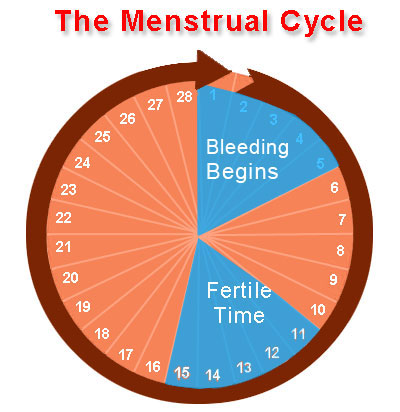In this articleHow does fertilization take placePre-ovulatory PhaseOvulatory PhaseMenstrual PhaseWhen is fertilization and pregnancy most likely to occur?What is necessary in order for pregnancy to occurHow does fertilization take place During each month of the female sexual cycle, there is a cycle increase and decrease of FSH and LH. Pre-ovulatory Phase: The pre-ovulatory phase is the time between menstruation and ovulation. During the first few days after the beginning of menstruation, concentrations of FSH & LH increase several fold. These hormones cause accelerated growth of 6-12 primary follicles each month. When under the influence of FSH, the group of follicles continue to grow and secrete estrogen. One dominant follicle becomes mature graafian follicle i.e. continues to increase its estrogen production under the influence of increasing level of LH. Small amounts of progesterone are produced by the mature follicle a day or two before ovulation. Ovulatory Phase: Estrogens liberated stimulate repair of endometrium and thicken it. New ovulation occurs on the 14th day i.e. there is rupture of mature graafian follicle. Post ovulatory is the period between ovulation and next menses. A single ovum is expelled from an ovarian follicle into the abdominal cavity in the middle of each monthly cycle. This ovum then passes through one of the fallopian tubes into the uterus and if it is fertilized by a sperm, it implants in the uterus where it develops into a fetus. Menstrual Phase: If fertilization does not take place, this ovum gets released in the mentrual phase. During the menstrual phase, follicles in each ovary begin to enlarge. Menstrual flow from the uterus consist of 50-150ml blood, tissue fluid, epithelial cells derived from endometrium. When is fertilization and pregnancy most likely to occur? Fertilization of an egg can only occur if you have intercourse around the time of ovulation, the so-called fertile phase of the cycle. If you are ovulating, this takes place l4 days before the onset of a period. This is a reasonably predictable event if you have a regular cycle but may be very unpredictable if you have a very erratic cycle. What is necessary in order for pregnancy to occur Ovulation is essential; Intercourse must take place during the fertile phase of the cycle; Your partners sperm count must be adequate to ensure that a sufficient number actually reach the egg; The mucus in the cervix must not be unfavorable and/or hostile to the sperm; There must not be any mechanical barrier preventing fertilization from taking place, such as blocked fallopian tubes or adhesions around the ovaries preventing the egg from gaining access to the tube and sperm.
How does fertilization take place
During each month of the female sexual cycle, there is a cycle increase and decrease of FSH and LH.
Pre-ovulatory Phase:
The pre-ovulatory phase is the time between menstruation and ovulation. During the first few days after the beginning of menstruation, concentrations of FSH & LH increase several fold. These hormones cause accelerated growth of 6-12 primary follicles each month. When under the influence of FSH, the group of follicles continue to grow and secrete estrogen. One dominant follicle becomes mature graafian follicle i.e. continues to increase it's estrogen production under the influence of increasing level of LH. Small amounts of progesterone are produced by the mature follicle a day or two before ovulation.
Ovulatory Phase:
Estrogens liberated stimulate repair of endometrium and thicken it. New ovulation occurs on the 14th day i.e. there is rupture of mature graafian follicle. Post ovulatory is the period between ovulation and next menses. A single ovum is expelled from an ovarian follicle into the abdominal cavity in the middle of each monthly cycle. This ovum then passes through one of the fallopian tubes into the uterus and if it is fertilized by a sperm, it implants in the uterus where it develops into a fetus.
Menstrual Phase:
If fertilization does not take place, this ovum gets released in the mentrual phase. During the menstrual phase, follicles in each ovary begin to enlarge. Menstrual flow from the uterus consist of 50-150ml blood, tissue fluid, epithelial cells derived from endometrium.
When is fertilization and pregnancy most likely to occur?
Fertilization of an egg can only occur if you have intercourse around the time of ovulation, the so-called 'fertile phase' of the cycle. If you are ovulating, this takes place l4 days before the onset of a period. This is a reasonably predictable event if you have a regular cycle but may be very unpredictable if you have a very erratic cycle.
What is necessary in order for pregnancy to occur
- Ovulation is essential;
- Intercourse must take place during the fertile phase of the cycle;
- Your partner's sperm count must be adequate to ensure that a sufficient number actually reach the egg;
- The mucus in the cervix must not be unfavorable and/or hostile to the sperm;
There must not be any mechanical barrier preventing fertilization from taking place, such as blocked fallopian tubes or adhesions around the ovaries preventing the egg from gaining access to the tube and sperm.

























